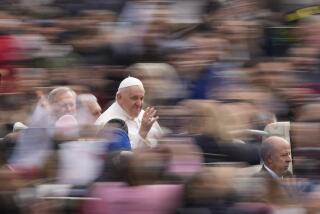Benedict the diplomat
- Share via
The conventional wisdom about Pope Benedict XVI’s first journey to the United States is that the pontiff is on two distinct missions: a pastoral visit,1,5949174.story to American Catholics and a diplomatic mission to the Bush administration, the international community and non-Christian religions. Actually, both aspects of the pope’s visit will test his diplomatic skills.
In addressing the U.N. General Assembly on Friday, the pope will be speaking not only as the head of a state (albeit a tiny one) but as a moral and religious leader. Like his predecessors, he is likely to preach powerfully against war and economic inequality. But he also could profitably address the role of religious differences in conflicts from Darfur to the Middle East to Tibet. The pope offended many Muslims in 2006 when, as part of a university lecture on the relationship between faith and reason, he quoted a 14th century Byzantine emperor who said the prophet Muhammad was responsible for “things only evil and inhuman, such as his command to spread by the sword the faith he preached.” To his credit, Benedict has encouraged dialogue between Christians and Muslims even as he has insisted that every individual has a God-given right to religious choice. He should acknowledge, however, that Christians too have wielded the sword in defense of their faith.
Paradoxically, the most exacting test of the pope’s diplomatic skills may come in encounters with members of his own flock. Can he apologize for sexual abuse of young people by a minority of priests without further demoralizing clergy who have been faithful to their vows? Can he reaffirm the church’s teaching against abortion without taking sides in the debate among American bishops about whether pro-choice Catholic politicians should be denied Holy Communion -- and without seeming to insinuate himself into a presidential election in which a pro-life Republican will oppose a pro-choice Democrat?
The pope’s diplomatic skills also will be tested when he addresses educators Thursday at the Catholic University of America in Washington. Like the late Pope John Paul II, Benedict is expected to insist that church-affiliated universities maintain their Catholic identity. Fair enough. But he should resist suggestions that he censure Catholic colleges that encourage robust debate even about such issues as abortion, homosexuality and women’s rights. The pope has called America “a nation which values the role of religious belief in ensuring a vibrant and ethically sound democratic order.” Outstanding Catholic universities both reflect and contribute to that democratic system.
More to Read
Sign up for Essential California
The most important California stories and recommendations in your inbox every morning.
You may occasionally receive promotional content from the Los Angeles Times.










